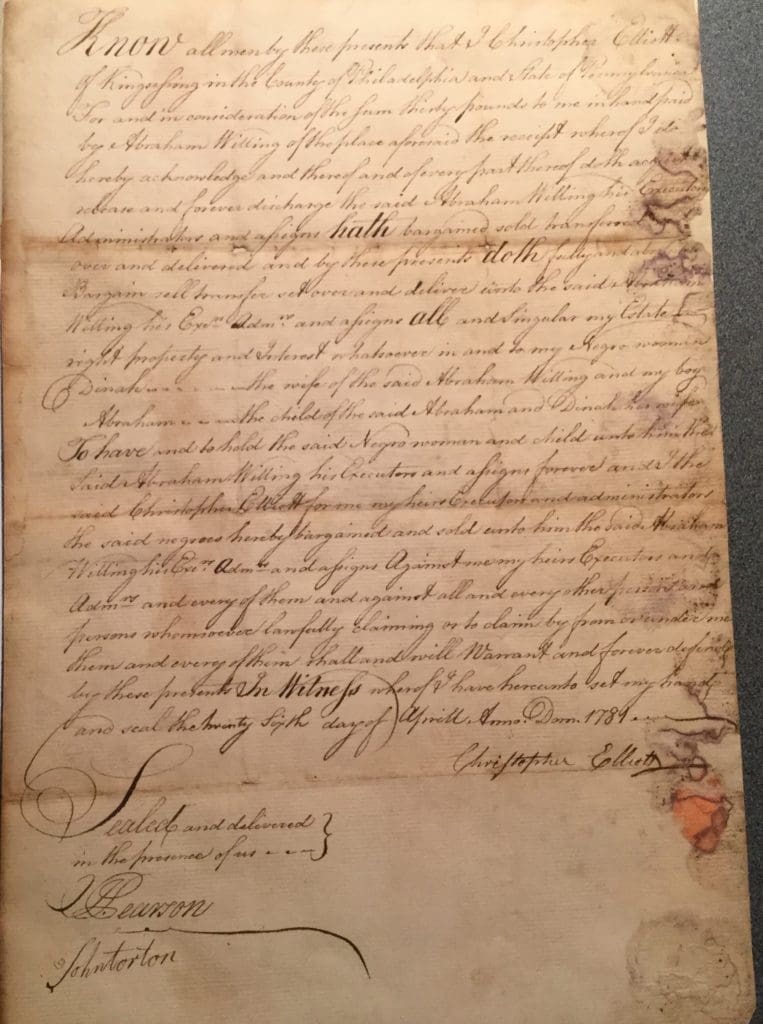Abraham Willing

Abraham Willing negotiated the purchase of his wife and son in Kingsessing Township in 1781. The sale of Dinah and Abraham Willing Jr. was somewhat unusual because they were enslaved by Christopher Elliott. Before the American Revolution, Elliott inherited land and several enslaved women from his father and uncle. In their wills, both men stipulated that Elliott free the women at the age of 30. Not only did Elliott fail to free the women, but he enslaved their children as well. According to a colonial law that continued after the Revolutionary War, children born to enslaved women automatically inherited their mothers’ legal status. Between 1768 and 1780, the group of women enslaved by Elliott gave birth to nine children. By 1784, the Pennsylvania Abolition Society (PAS) learned of Elliott and committed to freeing the women and their children.
Both Elliot and the PAS used laws to support their arguments for freedom or bondage. As required by Pennsylvania’s Gradual Abolition Act of 1780, children born in Pennsylvania to enslaved mothers after March 1st of that year were free after a period of indentured servitude. The Act also required slaveowners to register those remaining enslaved with the court clerk by November 1st. Those who failed to register the people annually held in bondage forfeited their rights to the enslaved person who was manumitted. Elliott claimed that the children belonged to him because their mothers were enslaved when the children were born. However, the PAS argued that the women’s legal status was altered when their previous owners died and their wills enforced. In short, the children were born free because their mothers were indentured, not enslaved. Elliott had sold four of the children to farmers in Chester County and registered the other five as slaves.
After 17 months, lawyers for the PAS resolved the case. Elliott was forced to free the women and three of the older children. Six of the remaining nine children were signed into indentured servant contracts with the permission of their parents. Due to the timeframe of Willing’s manumission document and the work of the PAS, there is a possibility that Dinah was one of the several women inherited by Elliott. Abraham Willing purchased the freedom of his wife and son for 30 pounds.[1]
[1] July 29, 1793, Historical Society of Pennsylvania, Pennsylvania Abolition Society Papers. Collection 0490, Box 2, folder 8.; Nash, Gary B. Forging Freedom: The Formation of Philadelphia’s Black Community, 1720-1840. Cambridge, Mass.: Harvard University Press, 1988.; Paul Finkelman, “The Kidnapping of John Davis and the Adoption of the Fugitive Slave Law of 1793”, The Journal of Southern History, Vol. 56, No. 3 (1990): 400.
Image: 1781 deed of emancipation for Dinah Willing and Abraham Willing Jr. Historical Society of Pennsylvania, Pennsylvania Abolition Society Papers. Collection 0490, Box 2, folder 8.


